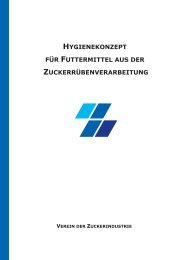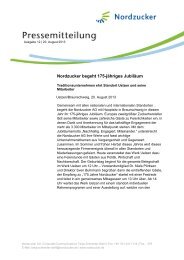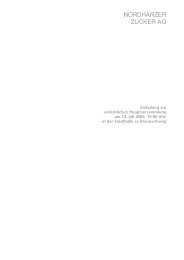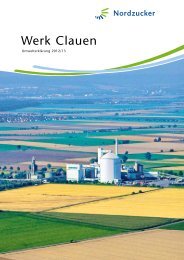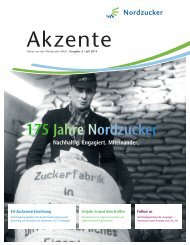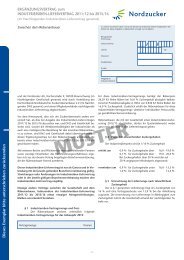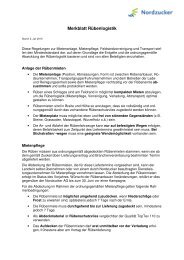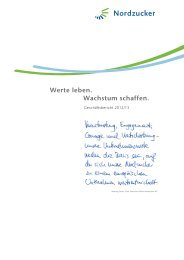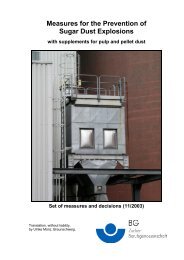downloads - Nordzucker AG
downloads - Nordzucker AG
downloads - Nordzucker AG
Create successful ePaper yourself
Turn your PDF publications into a flip-book with our unique Google optimized e-Paper software.
| A LOOK AT THE MARKET |<br />
THE SUGAR MARKET<br />
European Commission<br />
approves additional imports<br />
from the global market<br />
European Commission:<br />
1.2 million tonnes of<br />
additional sugar.<br />
Since the 2006 amendment to the EU sugar market regime,<br />
the EU has only been able to meet around 85 per cent of its<br />
needs in the food industry from domestic production. The EU<br />
has since become a net importer of sugar and, in particular,<br />
has become dependent on imports from so-called ACP / LDC<br />
countries (ACP = former colonies of France and the UK in Africa,<br />
the Caribbean and the Pacific; LDC = least developed countries).<br />
However, these imports do not come automatically. If the<br />
world market price is above the prices which can be achieved<br />
in the EU, there is only a limited incentive for the ACP / LDC<br />
countries to sell their sugar to the EU.<br />
In order to prevent a potential shortage of supply in the EU<br />
market, the European Commission has the option of ensuring<br />
a greater supply of sugar. There are two particular instruments<br />
available here: on the one hand, the conversion of non-quota<br />
sugar to quota sugar which may then be used in the food sector<br />
and, on the other, allowing additional imports with reduced<br />
import duties. As Akzente reported, the European Commission<br />
already made use of both of these instruments in the two previous<br />
sugar marketing years.<br />
Approving sugar for human consumption would relieve the<br />
market<br />
Given that the European Commission also expects supplies<br />
to be tight in the EU’s sugar market in the current 2012/2013<br />
financial year, it decided in January 2013 in the Management<br />
committee to bring an additional 1.2 million tonnes of sugar<br />
to the EU market. “With human consumption of around<br />
16.9 million tonnes, this amounts to around seven per cent<br />
of annual sugar consumption in the EU’s food sector,” says<br />
<strong>Nordzucker</strong> market expert Dr Klaus Schumacher. Half of this,<br />
totalling 600,000 tonnes, comes from the conversion of nonquota<br />
sugar to quota sugar. The applications for this approval<br />
were made by the sugar producers (maximum 50,000 tonnes<br />
per legally independent corporate entity). The European<br />
Commission divided the release of the 600,000 tonnes into<br />
four tranches, each with 150,000 tonnes. In view of the fact<br />
that the volumes applied for were much higher, allocation was<br />
made on a pro-rata basis. If non-quota sugar is released then<br />
levies must be paid. These are below the usual rate as a result<br />
of the special measures taken (see image). The remaining<br />
600,000 tonnes approved in January may be imported from<br />
any non-EU country with reduced import duties. This volume<br />
may not be imported all at once, but must be divided into a<br />
total of four tender procedures.<br />
Four tender procedures in 2013<br />
“In these so-called import tender procedures, the interested<br />
companies make a bid as to the amount of import duties per<br />
tonne they would be prepared to pay for a certain quantity of<br />
additionally imported sugar. Approval is then given to the bidder<br />
who offered to pay the highest import duties,” explains<br />
Klaus Schumacher. In the course of these four tenders, offers<br />
were accepted for a total of 371,000 tonnes of raw sugar and<br />
174,000 tonnes of white sugar. The reduced import duties<br />
were between EUR 141 and EUR 195 for raw sugar per tonne<br />
and between EUR 161 and EUR 240 per tonne for white sugar.<br />
The European Commission expects that the additional<br />
supply of 1.2 million tonnes of sugar will ensure sufficient stock<br />
levels until the end of the 2012/2013 sugar marketing year,<br />
and thereby ensure adequate supply in the market. tm, nt<br />
16





